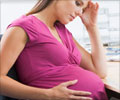Obese women could face higher rates of eclampsia and premature birth in their first pregnancy.
Also they were nearly twice as likely to give birth to a low-weight baby, weighing less than 5lbs 8oz (2.5kg), scientists at Kings College in London analysed data from the pregnancies of 385 first-time obese mothers.Experts say it is a huge issue for all maternity units in the UK.
At birth, 18.8% of their babies were classified as having a low birth weight - they weighed less than 2.5kg.
This compares with 10% of babies born to women of prescribed weight - known as the "healthy population".
Babies who were deemed to be of a particularly large weight made up 13.4% of those born to the women studied, compared to 10% in a healthy population.
Rates of pre-eclampsia were higher, with 11.7% of obese first-time mothers developing the condition compared to 6% of obese women with one or more previous pregnancies and 2% of the healthy population.
Advertisement
Premature births were almost twice the national average at 11.9%.
Advertisement
"The high number of cases of pre-eclampsia found in this group was very concerning as this is a serious pregnancy complication which, in extreme cases, can result in maternal and/or foetal death.
"We must now start to consider first-time pregnancy as an additional problem in obese pregnant women, who we know are already more likely than thinner women to have a complicated pregnancy."
The risks associated with prematurity and low birth weight include brain damage, difficulty with breathing, learning problems and greater susceptibility to infection.
Professor Postin said the reason why obesity causes these problems is not known but it's believed that insulin resistance may be the problem.
Insulin resistance is when normal amounts of insulin can't completely breakdown sugar in the diet.
"Normal pregnancy induces a mild form of insulin resistance and we know that obese people become more insulin resistant and that promotes diabetes, pre-eclampsia and macrosomia or bigger babies."
Increasing burden
The researchers say the women in the study had a high rate of Caesarean sections and warn that increasing numbers of obese pregnancies could make a major contribution to the rise in the number of caesareans in the UK.
They also point out that the women stayed longer in hospital, 4.6 days compared to a national average of three days or fewer.
Professor Jane Norman, professor of maternal and foetal health at the University of Edinburgh, said: "This study underlines and emphasises the pregnancy risks for obese women.
"It shows that women in their first pregnancy run a particularly high risk and that the issue about obese women is not just their weight before pregnancy but how much weight they gain during it.
"Obstetricians are just starting to wake up to this.
"Previously their concerns were twin pregnancies, diabetic mums and older women."
Professor Norman has set up a clinic for obese pregnant women at the Royal Infirmary in Edinburgh.
There are only two such clinics in the UK.
They try to encourage obese women not to gain too much weight during pregnancy.
Professor Norman said the extra costs of treating them were not just down to a longer stay in hospital: "We've had to buy in lots of new equipment in order to treat obese people properly.
"New operating tables and even new blood pressure cuffs because the ordinary ones give wrong readings on an obese person.
"This is a huge issue for all maternity units including our own."
Mervi Jokinen, from the Royal College of Midwives, said: "Obesity is an issue that is becoming increasingly prominent in maternity care and midwives are aware of the complexities and potential problems that obesity brings into pregnancy.
"We need to ensure that women get early access to a midwife so that she can get lifestyle and weight management advice as soon as possible, and that this continues throughout the pregnancy and after the birth of the baby.
"This survey also reinforces the need to tackle obesity not just as an issue for maternity services but as a much wider public health issue, because this is a health problem that affects men as well as women and children as well as adults."
Source-Medindia
GPL/S













